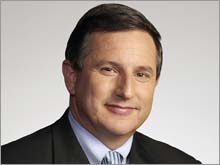|
HP's Hurd is contrite, but indictable? Mark Hurd sits down with Fortune's Adam Lashinsky and speaks candidly about the scandal that has rocked HP and the entire business world.
(Fortune Magazine) -- It's 8 A.M on Friday, Sept. 29, and HP CEO Mark Hurd and I are having coffee in a basement meeting room at the Four Seasons Hotel in Washington, D.C. Dressed in his unvarying uniform - dark suit, button-down shirt, crisply knotted tie - Hurd greets me in a near whisper. He is tense, which is understandable. Fourteen hours ago he wrapped up his testimony before a congressional panel that's poking into the spy scandal which has engulfed Hewlett-Packard (Charts). In a misguided attempt to break the ice, I ask if he's having fun yet. "I wouldn't describe this as fun, Adam," he says. Full stop. And so it goes for nearly an hour. What emerges is a picture of a chief executive who is bent but unbowed by what he's been through since it emerged in early September that HP investigators used despicable, and possibly illegal, tactics to uncover the source of a leak on its board of directors.
Hurd is contrite about the fact that he authorized a scheme to smoke out the leaker by sending misinformation to a reporter. Yet he's unwilling to address what that decision says about his own moral compass. "We had a fairly difficult situation," he says. "The team wanted my agreement that they could dangle some important information in front of the leaker. And I agreed to that. Now, hindsight's 20/20. We get a little more experienced and a little smarter as we go through things. I wouldn't do it again. But to be clear, I understood the team's strategy, and I agreed to that." I point out that difficult situations, not easy ones, are where ethics are truly tested. "We could talk about this for a long time," he responds. "It is what it is." Why didn't Hurd read a report he was given that explained the methods HP's investigators used to find the source of the leak? He explains that he was presented with a copy of the report when he walked into a meeting of the investigations team on March 15, the same day as his first address to shareholders. "I was about to deliver a speech," Hurd says, recalling the scene. "I probably wasn't as focused as sometimes I might be." More important, he says, because the leaker was identified as longtime HP director George Keyworth, he and then-chairwoman Patricia Dunn were immediately faced with a tough call on whether to push for a confrontation with the board veteran. "The question is, Do you pick up the document and turn to page whatever, or do you say, 'Are you sure?' " He opted for the latter and his team assured him that Keyworth was the culprit. "I can tell you ... my first reaction wasn't to say, 'Hey, Pattie, why don't you look backward at how the data was collected.' " Hurd has said repeatedly that the buck stops with him. Yet I point out that so far the buck has stopped primarily with Dunn and Ann Baskins, HP's veteran general counsel, both of whom have resigned. Hurd, in contrast, has been promoted, taking on the additional title of chairman. "I don't report to myself," he says. "I've been focused from the beginning on doing the best I can to fix this." He says he hasn't considered quitting, and he doesn't regret abandoning his relative obscurity as CEO of NCR (Charts) in Dayton to take the HP job. Repeatedly, he professes his love for HP and its employees, whom he's been reminding to hold their heads high. "I'm sorry for the people of HP that they've had to go through this," says Hurd. "But I believe the company will regain its pride." By the end of our hour, Hurd has relaxed considerably. He tells me he's received an avalanche of support from friends and strangers alike, especially after his session on Capitol Hill. I ask how he's blowing off steam, and he says he can't play tennis because of recent knee surgery and his rehab doctor is on his case for missing too many sessions. I ask if he can see the light at the end of the tunnel, and he points out that there are jobs to fill, there is a board to rebuild and there is litigation to fight. Says Hurd, as he bolts to hop a plane to Cedar Rapids, Iowa, where he's visiting a customer: "This is the end of the beginning." |
|

